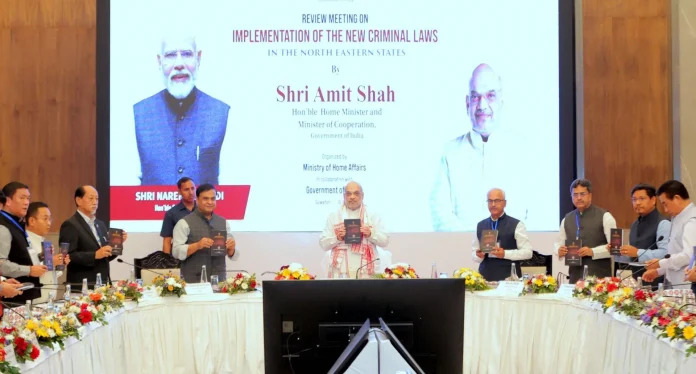GUWAHATI, March 17: Union Home Minister Amit Shah on Sunday chaired a review meeting in Guwahati to assess the status of the implementation of three new criminal laws in the northeastern states. During the meeting, Shah highlighted that once the new criminal laws are fully enforced, there would be a significant transformation in the region’s law and order situation. He cautioned that there should be no political interference in registering cases related to terrorism, mob lynching, and organized crime.
The meeting focused on the current status of various provisions related to police, prisons, courts, prosecution, and forensics in the northeastern states. Shah directed the state governments to monitor the progress closely and instructed police forces to prioritize securing citizens’ rights. He emphasized that the central government is committed to providing a speedy and transparent justice system, underlining the importance of registering crimes without delay.

Shah also stressed the need for more efforts from the northeastern states to ensure the proper implementation of the new criminal laws, which aim to ensure that justice is delivered by the Supreme Court within three years of an FIR being registered. He further insisted that all northeastern states should ensure that 100 percent of police personnel are trained in the new criminal laws.
In his address, the Union Home Minister requested the Chief Ministers of the northeastern states to hold monthly review meetings on the implementation of these laws. He also directed the Directors General of Police (DGsP) and Chief Secretaries of the states to conduct review meetings every 15 days. Shah emphasized the importance of reaching the grassroots level, ensuring that police stations become places where people receive justice. He noted that this would only be possible with the full implementation of the new laws.
Shah also highlighted the urgent need for the implementation of e-Sakshya, a digital initiative aimed at enhancing the efficiency of criminal justice processes. He pointed out that without sufficient scientific officers, it would be impossible to file fully satisfactory charge sheets from a forensic science perspective. Additionally, he encouraged the use of the “Trial in Absentia” provision, which would help bring fugitive criminals back to the country.
The Union Home Minister emphasized that a stronger Director of Prosecution would ease the process of ensuring justice for the people. He acknowledged that for a long time, the police in the Northeast were primarily focused on combating insurgency. However, with insurgency nearly eradicated in the region, the focus should now shift to protecting the lives, property, and dignity of citizens.
Shah also noted that the Narendra Modi government introduced the three new laws after an extensive deliberation process spanning nearly 45 months. Reports on the preparedness, achievements, and challenges in implementing the reforms were presented by individual states. Police modernization, capacity building, and responses to cybercrime were also discussed during the closed-door meeting.
The meeting was attended by the Chief Ministers of Assam, Arunachal Pradesh, Meghalaya, Mizoram, Nagaland, Tripura, and Sikkim; the Governor of Manipur; the Union Home Secretary; Chief Secretaries; DGsP of the northeastern states; and other senior officials from the Union Home Ministry and state governments.
During the meeting, Shah also unveiled a book titled New Criminal Laws: Standard Operating Procedures and Rules by CID, Assam. After completing his three-day visit to the region, the Union Home Minister left for New Delhi.

